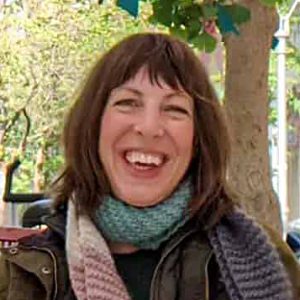By Emma Wallis
“The Schalke fans are a good example of multi-culturalism,” thinks fan Maciej Seweryn, known as Mac “because my name is too complicated for most people.” He himself came from Poland to Germany in 2007. First to study in Magdeburg and then on to Gelsenkirchen. Like the club itself, Mac appears to be well rooted in Gelsenkirchen. He has found his home in a Schalke fan club which fights racism and discrimination and talks about the city as if he was a local, which, of course, he now is. Mac thinks that Gelsenkirchen is open to Europe and the world because throughout the 20th century, due to its industrial base, the city welcomed successive waves of foreigners (Gastarbeiter), who, like Mac, have made the city their home. Mac notes that unlike some fan clubs for nearby football clubs in Dortmund (BVB) and Essen, Schalke has less of a problem with right-wing fans. “It’s strange because they were all built on that same [industrial] tradition,” he muses.
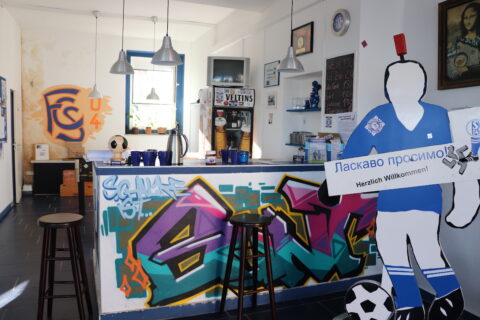
In fact, the group of supporters, who attend the workshop, think that sometimes Schalke fans can be too politically neutral, not wanting to challenge any views for fear of being seen as partisan, even when those views could be affecting someone’s basic human rights. Fabian, one of the supporters, agrees, “there’s no real big left-wing scene in Schalke but neither is there a right-wing scene here.” Martina, another supporter, points out though that this neutrality might be starting to rock, shake and crumble. In 2017, around 17 % of the city voted for the AfD and those changes in views are slowly being reflected in the make-up of fan groups in the stadium too.
Martina, who is active with the Green party and also in various initiatives to encourage integration within the city, thinks it is time for football fans to start to stand up for basic human rights; just like she does, and really actively pursue integration. She and the groups she works with have lots of dreams about transforming the relatively poor area of “North Schalke” on the fan mile towards the stadium. A local “sausage king” has donated some money and they have big dreams, although Mac remains quite sceptical until he sees actual results. “There have been too many big promises in the past which haven’t come to fruition,” he says quietly, whilst agreeing that changes are needed and welcomed.
Anti-Racist
Fabian thinks that Schalke fans’ openness towards others maybe really started cementing itself in the early nineties just after the fall of the Berlin Wall. As he tells it, it came out that one of the people accused of starting the fire in a house for refugees in Solingen had lots of Schalke memorabilia at home: It was at that point that fans decided to stand up against that kind of action and be counted. All the fans agree that things like monkey chants have absolutely no place on the terraces. It is not just security, but fans themselves, who police that kind of thing; the general feeling in the stadium is one of welcome.
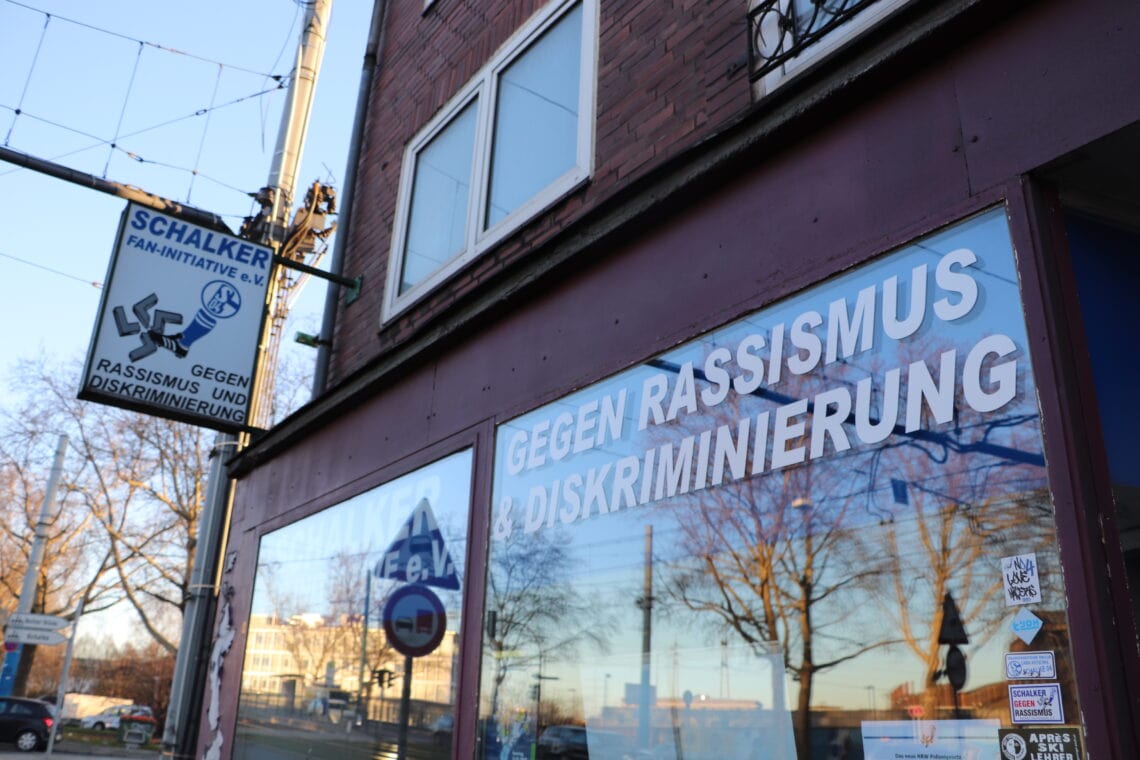
Some foreign teams also hold a special place in Schalke fans’ hearts. Not all though, but their relative welcome is not dependent on their nationality but on whether or not the fan clubs have made a connection with each other. Every year, Schalke fan clubs send a delegation to the Mondiali Anti-Razzisti in Italy, an organisation which joins football fans from around the world against racism. The Ultras have a special relationship with a Macedonian team and Salerno fans from Italy. A Liverpool football club scarf and various Polish teams, including one from Poznan are also proudly displayed on the club house walls.
The biggest problems they have had is with a Greek team, because sometimes Schalke fans fly a Macedonian flag and this caused a lot of problems with the Greek fans, but “not because they were Greek,” explains Martina. She shrugs and says “sometimes you don’t even know why we are friends with one team and not another but it really has nothing to do with nationality, more a shared history of football through hard times and good.” One of her favourite memories was travelling to Bilbao and swapping shirts with the rival fans, drinking together. “We have more that kind of experience than negative ones,” adds Martina; Fabian and Mac nod in agreement.
Football and Europe – Making connections
“And that is good for Europe too,” explains Mac. “Building these kinds of civil society networks, making personal contacts and friendships are the cement of Europe and its people,” explains Martina. This togetherness is what they all find in their membership of their various clubs and organizations. But things could go further according to Martina. Football doesn’t always facilitate integration as much as they would hope. Take the Roma people who reside in many of the big old buildings which line the busy “fan mile” on the Kurt-Schumacher-Straße. They do not take part in stadium life as much as their presence in the neighbourhood might suggest. “There are some programmes for refugees and migrants and sport,” says Martina, struggling to remember “you know that strange game…[cricket]” which has been set up for refugees and asylum seekers from south Asia and Afghanistan. But of those longer-term residents of the city, who may have roots elsewhere, they are really already present in the stadium, insists Martina. What we need, explains Martina is “to speak WITH each other and not ABOUT each other.”
Fabian nods. “In the stadium it is mostly white German men. There are probably about 2% of people with what the Germans call a ‘migration background’. That really doesn’t reflect the make-up of the city, and makes me unhappy,” adds Fabian.
Glückauf!
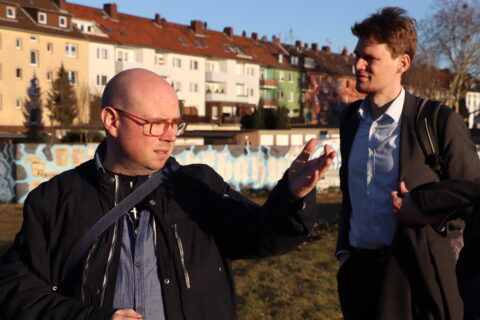
Mac notes the contradiction that although Schalke was formed, and still sees itself as a “club for miners” and the fans sing songs about mining, most of the current stadium-goers don’t even live in the city. All three fans note that for many who actually live in Gelsenkirchen, ticket prices can be too high. Even with certain initiatives, like the possibility of paying 25 euros a year for young members under 30; and 50 euros a year for those who are over 30 for standing seats and a possibility of voting in some of the administrative decisions, for the big matches, the prices are just too much. Lots of people will drive in with their cars from over 100 kilometres away.
Fans come from further afield too, “lots of English fans like to come and drink cheap beer and stand, because they can’t stand in their stadiums,” says Martina. This kind of football tourism is half welcomed and half frowned upon. Its implied gentrification makes ticket prices for some of the more popular seats rise and that is no good for anyone the group thinks. They are also not particularly happy about the club’s sponsors Gazprom, but “what can you do” they shrug ruefully. Acknowledging that today football and big business goes hand in hand, whether they like it or not. “They brought much-needed money when the club most needed it.” And not all the old traditions have been forgotten, says Mac. There are still 16,300 standing places in the stadium and some of those tickets are sold for 15,50 Euro a time. “It can be difficult to get those tickets though,” he acknowledges.
‘Football is an international language’
“Football is an international language,” states Mac, remembering fondly his time chatting to Swedish fans in a train. He thinks that the EU has facilitated that. It was easy for him to move from Poland to Germany and it is easy for all these other fans to visit and exchange and spend time in other countries in the bloc too. “You forget how difficult it is for non-EU citizens,” muses Mac. He studied in Magdeburg and had to help some Ukrainian friends of his who had exactly the same university background as him, but because they were born in a non-EU country, they found it much harder to get the kind of work that he had just walked in to.
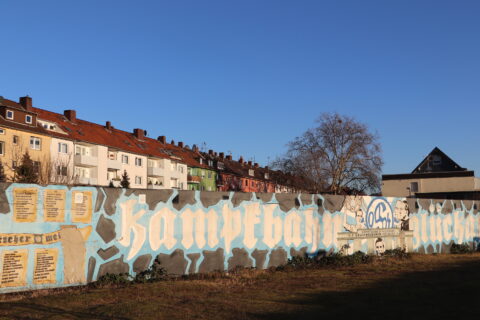
After all this praising of the EU and football and fan exchange, Fabian wondered whether “Wir Sind Europa” is also talking about the things that people might not be so happy about with regards to Europe. He brings up the 10,000 deaths of migrants in the Mediterranean, the idea of Fortress Europe, the newly enforced outer borders and asks whether we should be careful about just praising this institution from our own perspectives: ease of travel and study for those within the bloc. Martina wonders why the EU was ever awarded the Nobel Peace Prize for instance.
These are questions which can’t be solved by the group but Fabian thinks it is important to pose them. Soon after, as time draws to a close, Mac arms everyone with a bottle of beer and shows us the old stadium, complete with blue and white graffiti with the famous mining greeting “Glückauf” written on the old stadium’s walls. Today, it is a grassy pitch with a few people kicking a ball about; the group explains that at Christmas they have organised carol concerts here and with various other initiatives, the old stand is being developed, with some of the sausage king’s money, and lots more community events are planned for the future. That is what the group is working towards, more integration, more sense of community, and a return to the values which they feel football, and their city, once held dear: community, solidarity and a helping hand for all those in need, wherever it is they might have originally come from.
—
Emma Wallis was born in London and lives now in Germany where she works as a freelance journalist. She is member of the „Wir sind Europa!“-Basisgruppe.
Fotos: Jonas Krohn
